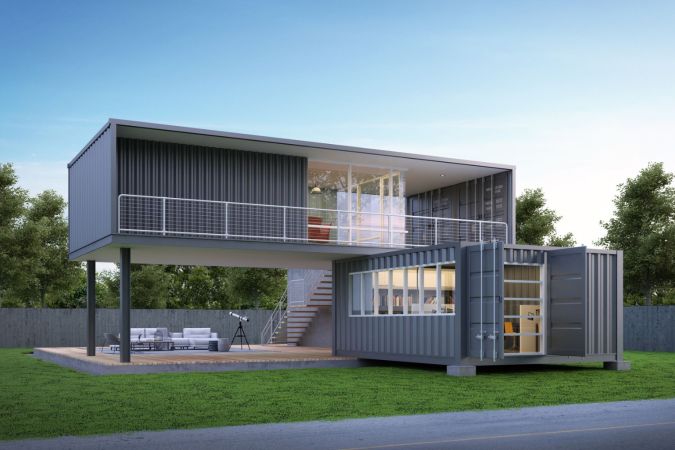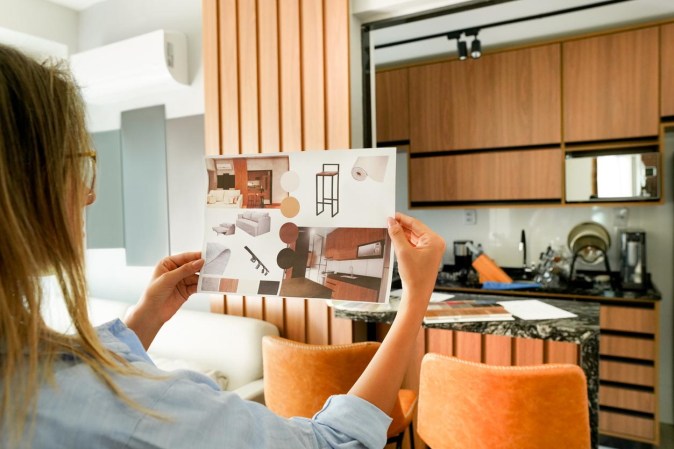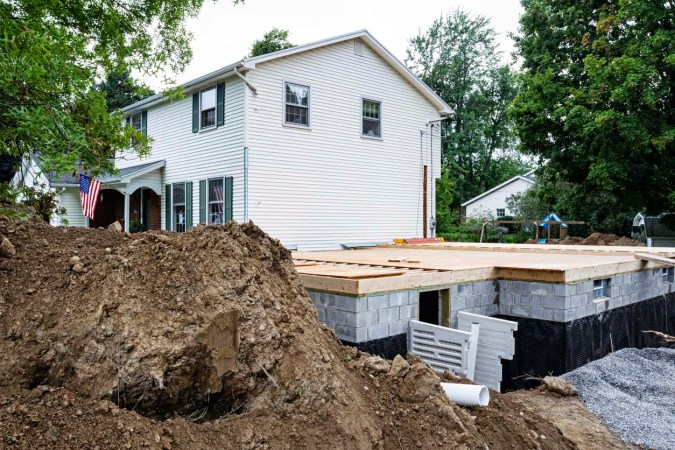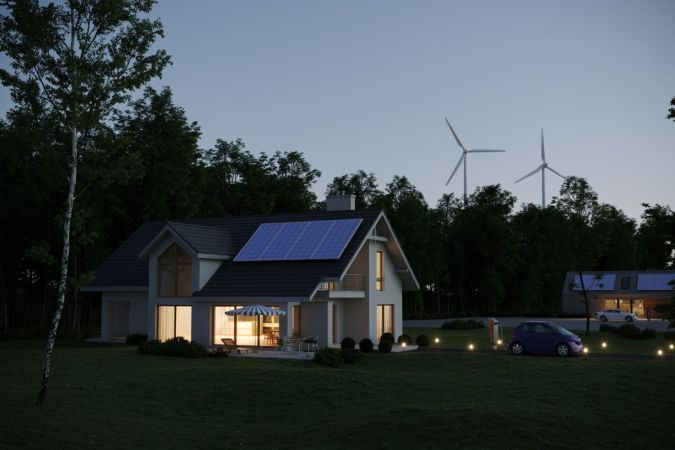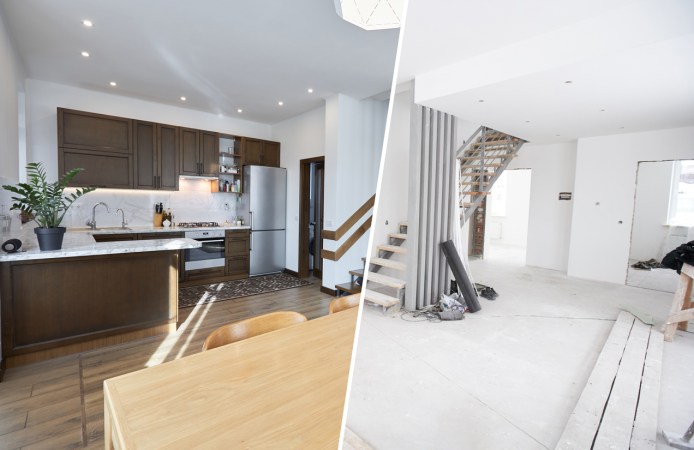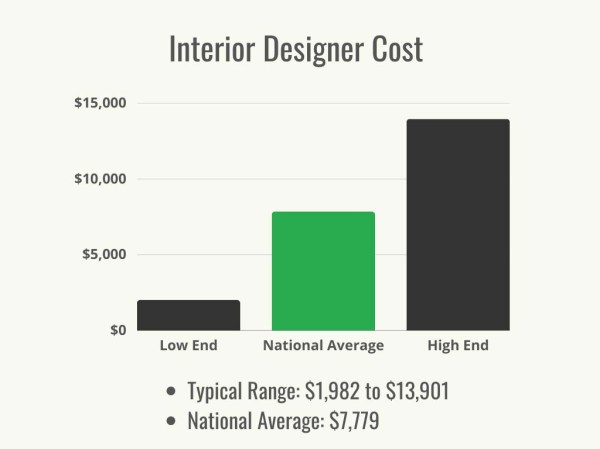We may earn revenue from the products available on this page and participate in affiliate programs. Learn More ›
Highlights
- The typical cost range for hiring an architect is $2,175 to $10,480, with a national average of $5,980.
- Some of the factors that affect the cost to hire an architect include the architect’s expertise level, their fee structure, the type of project, the architect’s involvement level, the home’s geographic location, and difference in cost between a new build and a remodel.
- Homeowners may need to hire an architect when they are building a new home or remodeling an existing one, when the home’s layout is inconvenient or lacks space, or for local building code adherence.
- Although a homeowner may be able to come up with ideas for a home remodel, an architect has the experience and knowledge to create a plan that will result in a successful project.
Whether a homeowner plans to build a new home or renovate an old one, hiring an architect to draw up plans can ensure that the builder has the information they need to keep the project on track. The cost to hire an architect is between $2,175 and $10,480, and the national average is $5,980 according to Angi and HomeAdvisor. Another way a homeowner can estimate the cost of hiring an architect is to use a percentage of the total construction cost—typical rates fall between 5 percent and 20 percent.
Architects may charge different rates depending on their skill and experience level, the complexity of the plans, and the number of revisions they have to make as the project moves forward.
Factors in Calculating How Much An Architect Costs

Architect costs vary widely depending on a number of considerations, and it may actually cost more for an architect to design plans for a remodel than a new build because they have to account for changes to the existing structure and may need to make changes if the contractors encounter any surprises.
Architect Expertise Level
Architects often charge different rates depending on their expertise and experience level. For instance, a principal architect, typically the owner of the firm, charges $150 to $250 per hour, while an Intern I with only 3 to 5 years of experience may charge as little as $45 per hour. Project managers with 10 or more years of experience charge $125 per hour, and an Intern II with 6 to 8 years of experience will charge around $90 per hour.
| Architect Expertise Level | Average Cost per Hour |
| Principal | $150 to $250 |
| Intern I | $45 |
| Project manager | $125 |
| Intern II | $90 |
There are pros and cons to hiring architects at each different level. For instance, a principal has more experience but may have a heavier workload and be in higher demand. While an intern architect lacks experience, they may make up for it with the excitement of a newly minted diploma.
Fee Structure
Fee structures can differ depending on the architect and type of project they’ll be doing. Architects can charge by the hour, the number of square feet, a percentage of the total construction costs, a fixed rate, or a combination of the different structures. It’s important for homeowners to clearly understand how the architect will be billing the project in order to budget accurately. The different types of architect fee structures are discussed in more detail in a section below.
Project Type
The actual cost of hiring an architect is largely dependent on the type of project they’ll be working on. For instance, regardless of the fee structure, a full-home remodel will likely cost more than plans for kitchen cabinets or a simple floor plan design. Below are a few examples of project types and the estimated cost associated with them.
| Project Type | Average Cost |
| Basic remodel | $2,500 to $10,000 |
| Landscape design | $1,944 and $7,213 |
| Large renovation | $18,161 to $76,367 |
| New construction | $15,000 and $60,000 |
For a basic kitchen remodel with new cabinets and countertops or the design for an outdoor space that won’t affect the structure of the house, an architect can charge between $2,500 and $10,000 for their services. If their fee is a percentage of the project, they’ll likely charge between 10 percent and 20 percent.
If a renovation requires demolition, including walls and floors, as well as upgrades or additions, the cost will be higher than for a basic remodel. A major home renovation can cost between $18,161 and $76,367 or more. The total cost will also include any revisions the architect does to the plans if unforeseen circumstances occur or more work is required than initially thought.
In some cases, new-construction drawings may cost less than large-home renovation plans because there won’t be as many unknowns. But the cost for architectural drawings for a new home is often charged as a percentage of construction costs and falls between 5 percent and 20 percent.
Building a home costs between $158,572 and $478,600, and on average, it takes an average of 7 months to build a new home. So if the total cost of construction is $300,000, the cost estimates will be between $15,000 and $60,000, with custom plans falling at the higher end. This wide range is the reason it’s important to get accurate cost estimates and be aware of any hidden costs before setting the project budget and starting the work.
If the home upgrades are focused on the exterior landscaping, hiring a landscape designer can help create a cohesive space that fits with the architecture of the home. A landscape designer costs between $1,944 and $7,213.
Involvement Level
How involved the architect is in the process can also affect how much they cost. For a basic floor plan or a custom drawing, an architect may charge only a few thousand dollars. The cost will go up as they become more involved with the process. Involvement levels can be broken down by design phase and compose a percentage of the total project cost.
| Design Phase | Percentage of Total Cost |
| Predesign | 5 percent |
| Schematic design | 15 percent to 20 percent |
| Design development | 10 percent to 20 percent |
| Construction documents | 40 percent |
| Bidding and negotiation | 5 percent |
| Construction administration | 20 percent to 25 percent |
- Predesign (5 percent): The architect and the homeowner will need to discuss the scope of the project, the desired results, and the actual work the architect will need to complete.
- Schematic design (15 percent to 20 percent): In this phase the architect will create a preliminary design that includes the basic concept of the work. The homeowner and architect will review the plan and then move the project to the next phase.
- Design development (10 percent to 20 percent): This phase is when the architect will turn the schematic design into detailed drawings that include instructions for how the project should be executed.
- Construction documents (40 percent): The technical drawings created in this phase are what will be used to secure contractor bids and ultimately hire the right contractor for the job.
- Bidding and negotiation (5 percent): Architects will often have lots of experience working with contractors, so they can work with the homeowner to evaluate bids and help in the negotiation process to help choose the best home renovation contractor for the project.
- Construction administration (20 percent to 25 percent): Some architects work as project managers and help to move the plans from the page to reality, helping the contractor execute the architectural designs and keeping the project on track.
Geographic Location
Another factor that impacts how much it costs to hire an architect is the geographic location of the project. Where the project is located impacts the building permits that are needed, local building codes, the price of materials, and architect fees. For instance, in California, architect fees range from $3,600 to $15,200, while they can be as low as $1,000 to $3,300 in Colorado. Below are the average costs to hire an architect in several states.
| State | Architect Cost |
| Arizona | $2,800 to $6,400 |
| California | $3,600 to $15,200 |
| Colorado | $1,000 to $3,300 |
| Illinois | $3,000 to $9,800 |
| Maine | $2,000 to $9,400 |
| Nebraska | $2,000 to $9,400 |
| North Carolina | $1,800 to $2,000 |
| Pennsylvania | $2,600 to $7,400 |
New Build vs. Renovation
It may seem counterintuitive, but architect fees for a renovation project can actually be higher than fees for a new build. Plans for custom homes typically fall between $3,000 and $8,000, and the architect is responsible for providing detailed construction drawings that the building authorities will approve and the builder can follow.
For home renovation projects, there can be more unknowns and unforeseen issues that reveal themselves at any stage of the project, especially if the owners are new or bought the house to flip. Older houses can reveal modern building code violations that need to be remedied, plumbing may need to be rerouted, and structural issues may be found during demolition. Plus, the architect may need to make more site visits to assess the existing structure and make adjustments as needed. Architect costs for home renovations typically fall between $2,400 and $14,000, which can be added to the base cost to flip a house.
Additional Costs and Considerations
Besides the costs to draw up architectural plans, there are additional costs and considerations to take into account when hiring an architect for a project. Residential and commercial architect fees will vary, and the architect should have specific knowledge of building codes for the type of construction. Architects may also charge extra to make 3D renderings and design revisions and to secure building permits.
Residential vs. Commercial Architect
Residential architects primarily work on single-family homes or small apartment buildings. Their services range from drawing up basic floor plans or kitchen cabinet layouts to creating fully detailed construction drawings that include plans for electrical wiring, appliance layouts, and plumbing. Their fees fall between $2,500 for basic services and $60,000 or more for a custom home design with full construction drawings.
Commercial architect fees also fall in a wide range—from $8,000 up to $3,000,000—depending on the scope of the project. A warehouse, for instance, likely won’t cost as much to design as a high-end office building or luxury retreat. Commercial architect fees run from 2.5 percent to 12 percent of the total cost of construction.
Modification vs. Custom Design
In some cases, the homeowner may find plans that they like but that need a few modifications. Architects may charge per hour for this service, because it may not be clear how much time it will take to complete the work. Modifications for predesigned plans can cost $60 to $250 per hour, so if the work is simple, the cost to create the right design can be relatively low. This can be a good plan for homeowners with a limited budget, because they’ll have some custom elements for a lower price than the cost of fully customized plans.
Custom designs cost more than modifications to existing plans. Some architects include the initial design as a complimentary service in the predesign phase, but the homeowner may then pay for modifications to the design and will have to pay for the construction documents and other services such as help going through contractor bids. Custom house plans can cost between $10,000 and $60,000.
Reimbursable Expenses
Certain expenses, such as airfare, mileage, printing or shipping costs, and travel, are often considered reimbursable expenses, and the homeowner will reimburse the architect for money they spent for these services throughout the process.
3D Renderings
3D renderings can help a homeowner visualize the final product, and as a result, homeowners may be willing to pay the added cost to help see their project before they actually start construction. This service and the rendering will cost between $200 and $800 per image.
Design Revisions
The cost of minor design revisions may be rolled into the cost of the design plans, but continual or larger revisions will likely add to the total cost. A good question to ask the architect is how many revisions they typically do on a project of this type and how many, if any, are included in the base price.
Building Permits
When the designs are complete, the architect will submit them to the building authorities to obtain the building permit for the project. The cost for building permits ranges from $1,200 to $2,000 and will be reimbursed to the architect.
Land Surveys
Part of the process of building a new home is obtaining a land survey, the cost of which will be reimbursed to the architect. A land survey may also be needed for major remodel projects or additions to a home.
Interior Designer
Even though architects can be involved in many parts of the planning and building process, once the home is built, they don’t usually offer interior design services. If a homeowner wants help choosing furnishings, decor, window coverings, or finishes, hiring one of the best interior designer services may be the best route. Or homeowners can use one of the best interior design apps to get inspiration and to create the interior design plan. Though hiring both an architect and designer adds an additional cost to the project, it may be worth it to achieve the perfect home.

Architect Cost by Type of Fee Structure
Architects can charge for their services in a variety of ways, including hourly, per project, and as a percentage of construction costs. In some cases, architects will use a different fee structure for different phases of the project. For instance, in the initial design phase, the architect may need to contact the homeowner to ask questions and may charge an hourly rate for their time. For projects where the scope is largely known, the architect may be more likely to charge by the project as a whole or as a percentage of the total construction costs based on the complexity of the project.
| Fee Structure | Cost |
| Hourly | $45 to $250 |
| Per square foot | $2 to $15 |
| Percentage of construction | 5 percent to 20 percent |
Hourly
Architects charge different hourly rates based on their level of professional experience and expertise. This can help the homeowner stick to their budget, potentially sacrificing experience for a lower price tag—though this doesn’t mean the work will necessarily be affected. Hourly rates for principal architects can run as high as $250 per hour or more, while the rate for beginning intern architects will be closer to $45 per hour.
Per Square Foot
The per-square-foot fee structure can vary greatly depending on the style and complexity of the project and any unique challenges it poses. The cost will also depend on the role of the architect and will fall between $2 and $15 per square foot.
Percentage of Construction
Architects charge between 5 percent and 20 percent of the project cost, but the average falls between 8 percent and 15 percent. New-construction jobs typically fall on the lower end of the scale, but because the cost to build an entire home will likely be more than for a small remodel, new builds may still cost more, making the architect’s fees higher.
Combination
Certain projects may work best using a combination fee structure. This means that for some portion of the work (the initial design phase, for instance), the homeowner may be charged hourly. Once the architect has a better idea of the scope and overall cost of the project, they may switch to a fixed fee or percentage of construction. The actual project costs will be a mix of different methods.
Fixed Fee
A fixed fee means that the architect will give you a quote for the cost of their services for the entire project. This is nice for homeowners on a limited budget because they’ll know up front what the architect’s services will cost and can plan and budget other aspects of the project accordingly.
Do I need to hire an architect?
While it seems that architects are best known for the new-home plans they provide, they are actually an integral part of many other home construction projects that could include creating a better layout, completing a major home renovation, or adding space to a home that lacks it. Hiring an architect or a designer for different types of projects can help them go smoothly.
New-Home Building
Architects are almost always involved with a new-home building project. Even if the homeowner is using predrawn plans, an architect had their hand in the process. Sometimes a homeowner will have an architect modify an existing home plan. In other cases, the architect is responsible for starting from scratch and creating a fully customized plan that includes electrical and plumbing. Combining an architect with one of the best home builders can result in the customer’s dream home.
Home Remodeling
Hiring an architect for a home remodeling project, especially a larger one, can ensure that everyone working on the project is on the same page. It also means there is another person on hand to help work out any unforeseen issues or make modifications based on how the project is taking shape. For a simple home remodel, opting to pay interior designer costs may help with the planning, but for more complex projects, hiring an architect is the way to go.
Inconvenient Home Layout
One reason that homeowners hire an architect is to remedy an inconvenient home layout. If the layout of the home just isn’t working, an architect can draw up plans and offer options for ways to change the layout, which usually means removing or building walls. This requires a knowledge of how the home was built, which walls are structural and which aren’t, and ways to stay within local building code requirements.
Lack of Space
If a home lacks space, then an addition can be the solution to create more room in the home. Architects can design additions to blend with the existing home and work out the best way to increase the space. The scope of additions can vary widely, so working closely with an architect, especially in the early stages, can ensure the homeowner gets exactly what they want. Budgeting for an architect as part of home addition costs can help ensure the project goes the way the homeowner envisions.
Building Authority Requirements
Architects are experts on local building codes, which means they’ll be able to create plans that adhere to requirements while also meeting the needs of the homeowners. If a building permit is required for a new build or a renovation, an architect will likely need to be involved in order to get the plans approved and ultimately secure the building permit.
Construction Planning: DIY vs. Hiring a Professional
Unlike a lot of home improvement projects that can be done by homeowners with some experience, the right tools, and a willingness to learn, construction planning is difficult to do unless the homeowner has a detailed knowledge of design, electrical wiring, plumbing systems, and more. But this isn’t to say the homeowner can’t be involved in the design process—in fact, it’s best if they are.
In the initial consultation meeting with the architect, the homeowner will discuss their design ideas and goals and can even bring rough sketches to better illustrate their vision. After that, the homeowner can work closely with the architect to see that those design ideas come to life on the page.
Becoming an architect requires 5 to 7 years of schooling and coursework and then the completion of 3,740 internship hours, with the intention of giving architects in training the skills and knowledge they need to protect public well-being once they are on the job. These requirements make them uniquely qualified to take on new-home or renovation plans.
How to Save Money on the Cost to Hire an Architect
Hiring an architect can take up a significant chunk of a new-build or renovation budget, so it may be important for homeowners to look for ways to save money on architecture costs, including the following.

- Stick to an architect with less experience. Choose an architect at the Intern I or Intern II level. They will have less experience than a principal or project manager but will also charge less.
- Keep it simple. Simplify the project, so there is less for the architect to design.
- Skip the expensive add-ons. Pass on the 3D rendering, which can add hundreds of dollars to the final price.
Questions to Ask When Hiring an Architect
Because hiring an architect will be a significant portion of the new-build or renovation budget, hiring the right professional is essential to helping the project go smoothly. The American Institute of Architects offers a list of 20 questions that will help guide the first meetings with the architect and ensure that everyone has a good idea of the scope and goals of the project. Here are a few from the list, plus a few more:
- What are the important issues or considerations for the project?
- What are the challenges of the project?
- What are the steps in the design process?
- How does the architect organize the process?
- What is the architect’s design philosophy, and does it align with the homeowners?
- What is the architect’s experience/track record with cost estimating?
- What services does the architect provide during construction (communication with the contractor, site visits, bidding and negotiation, etc.)?
- Does the architect have recommendations for contractors?
- How accessible is the architect, and can they answer questions for the homeowner as they come up?
FAQs
There is a lot to consider when hiring an architect, but including one, or a team, in the process can ultimately make it go more smoothly and help to avoid as many unforeseen issues or roadblocks as possible. But with that said, hiring an architect isn’t something that homeowners do every day, and so there are a lot of questions that can arise about the process, including the following.
Q. Why do architects charge so much?
Becoming an architect requires rigorous coursework, an internship, a knowledge of technical systems like electrical wiring and plumbing, and the ability to oversee the planning, application, and execution of the architect’s designs. Their fee reflects years of schooling and practical experience.
Q. Do I need an architect to draw plans?
The answer is likely yes. Not only do some local municipalities require an architect or structural engineer to approve plans before moving forward with permits, architects have a deep understanding of what it takes to complete a successful build or renovation and can provide the detailed drawings to achieve it.
Q. Do architects charge for drawings?
Architects will charge between $2,000 and $20,000 for drawings. These drawings will include detailed instructions that contractors follow when they’re executing the plans. The total cost, whether the architect charges hourly, per square foot, as a percentage of construction costs, or as a fixed fee, may include design consultations, the actual blueprints, bidding and negotiation with contractors, site visits, and more.
Q. How long does it take an architect to draw plans?
The amount of time it takes an architect to draw plans depends on a number of factors, including their workload, the complexity of the project, and the number of revisions. Because of this, the final plans can take between 1 and 4 months to complete. First-draft drawings may take as little as 3 days and up to 2 weeks after the initial project consultation.
Q. How much does a draftsman charge versus an architect?
A draftsman’s main job is to work on the construction documents—the detailed blueprints and plans for the project. A draftsman may work independently and design blueprints for homeowners, or they may work with an architect on this phase of the project. Because their scope is smaller, a draftsman typically charges between $30 and $120 per hour. An architect is responsible for more phases of the project, and this larger scope means that they’ll charge more, sometimes up to $250 an hour or more.
Q. What percentage of the project does an architect cost?
The fee for an architect, regardless of how they structure it, will typically fall between 8 percent and 15 percent of the total project cost. Depending on the complexity and scope of the project, hiring an architect can cost as little as 5 percent and as much as 20 percent of the total project cost.
Q. How much does a structural engineer cost?
A structural engineer evaluates the infrastructure of a building, including how the building will withstand wind loads, gravity, and lateral force. Some municipalities will approve building permits that have been approved by a structural engineer. A structural engineer costs between $100 and $200 per hour.
Q. How much does an architect charge for a site visit?
The cost for a site visit will vary and may be included in the cost of the initial design. A site visit allows the architect to fully understand the details of the project and can help them draw up their plans. If the architect is on an hourly fee structure, homeowners can expect to pay between $45 and $250 per hour that the architect is on the site plus possible reimbursables such as gas or mileage.
Q. What is an architect’s responsibility to clients?
When working with a client, the architect is responsible not only for producing plans and proposing design solutions but also for understanding the client’s vision and balancing that with practical solutions and plans. They will provide detailed drawings and in some cases help with bidding and negotiations with contractors, visiting the site to assess progress and spot any issues, and provide support to the homeowners as they see their vision come to life.
Sources: Angi, HomeAdvisor, HomeGuide, Fixr, Forbes, NewSchool of Architecture and Design, The American Institute of Architects


